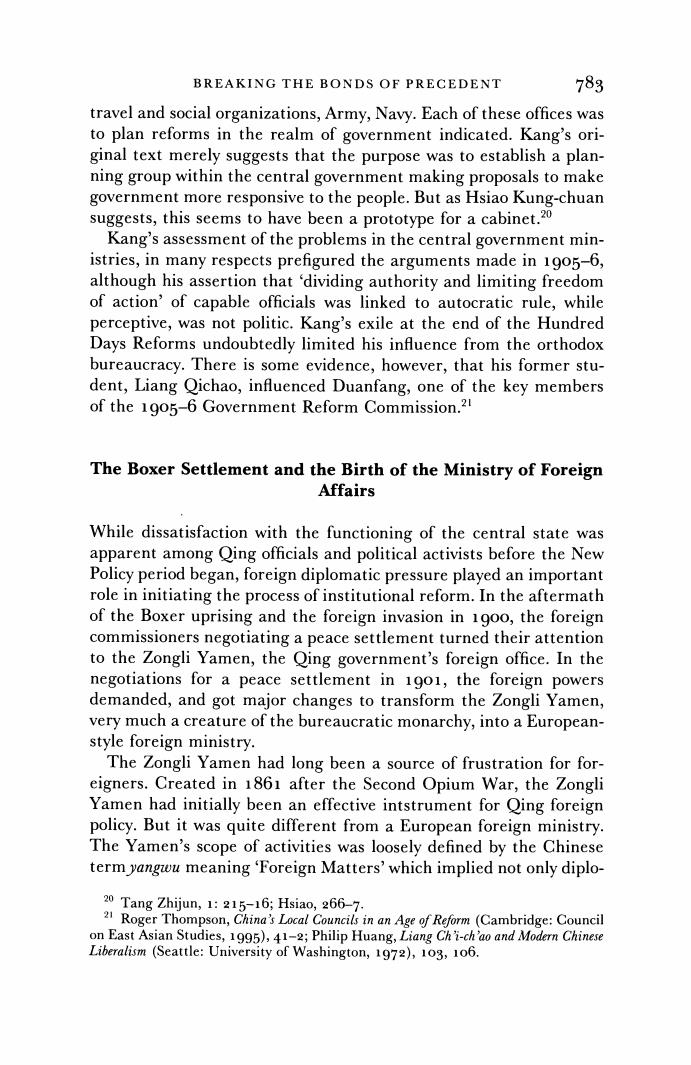正在加载图片...

BREAKING THE BONDS OF PRECEDENT 783 travel and social organizations,Army,Navy.Each of these offices was to plan reforms in the realm of government indicated.Kang's ori- ginal text merely suggests that the purpose was to establish a plan- ning group within the central government making proposals to make government more responsive to the people.But as Hsiao Kung-chuan suggests,this seems to have been a prototype for a cabinet.20 Kang's assessment of the problems in the central government min- istries,in many respects prefigured the arguments made in 1905-6, although his assertion that'dividing authority and limiting freedom of action'of capable officials was linked to autocratic rule,while perceptive,was not politic.Kang's exile at the end of the Hundred Days Reforms undoubtedly limited his influence from the orthodox bureaucracy.There is some evidence,however,that his former stu- dent,Liang Qichao,influenced Duanfang,one of the key members of the 1905-6 Government Reform Commission.21 The Boxer Settlement and the Birth of the Ministry of Foreign Affairs While dissatisfaction with the functioning of the central state was apparent among Qing officials and political activists before the New Policy period began,foreign diplomatic pressure played an important role in initiating the process of institutional reform.In the aftermath of the Boxer uprising and the foreign invasion in 1goo,the foreign commissioners negotiating a peace settlement turned their attention to the Zongli Yamen,the Qing government's foreign office.In the negotiations for a peace settlement in 1901,the foreign powers demanded,and got major changes to transform the Zongli Yamen, very much a creature of the bureaucratic monarchy,into a European- style foreign ministry. The Zongli Yamen had long been a source of frustration for for- eigners.Created in 1861 after the Second Opium War,the Zongli Yamen had initially been an effective intstrument for Qing foreign policy.But it was quite different from a European foreign ministry. The Yamen's scope of activities was loosely defined by the Chinese term yangwu meaning Foreign Matters'which implied not only diplo- 20 Tang Zhijun,1:215-16;Hsiao,266-7. 21 Roger Thompson,China's Local Councils in an Age of Reform(Cambridge:Council on East Asian Studies,1995),41-2;Philip Huang,Liang Ch'i-ch'ao and Modern Chinese Liberalism (Seattle:University of Washington,1972),103,106.BREAKING THE BONDS OF PRECEDENT 783 travel and social organizations, Army, Navy. Each of these offices was to plan reforms in the realm of government indicated. Kang's original text merely suggests that the purpose was to establish a planning group within the central government making proposals to make government more responsive to the people. But as Hsiao Kung-chuan suggests, this seems to have been a prototype for a cabinet.20 Kang's assessment of the problems in the central government ministries, in many respects prefigured the arguments made in 1905-6, although his assertion that 'dividing authority and limiting freedom of action' of capable officials was linked to autocratic rule, while perceptive, was not politic. Kang's exile at the end of the Hundred Days Reforms undoubtedly limited his influence from the orthodox bureaucracy. There is some evidence, however, that his former student, Liang Qichao, influenced Duanfang, one of the key members of the 1905-6 Government Reform Commission.21 The Boxer Settlement and the Birth of the Ministry of Foreign Affairs While dissatisfaction with the functioning of the central state was apparent among Qing officials and political activists before the New Policy period began, foreign diplomatic pressure played an important role in initiating the process of institutional reform. In the aftermath of the Boxer uprising and the foreign invasion in 1900oo, the foreign commissioners negotiating a peace settlement turned their attention to the Zongli Yamen, the Qing government's foreign office. In the negotiations for a peace settlement in igo1, the foreign powers demanded, and got major changes to transform the Zongli Yamen, very much a creature of the bureaucratic monarchy, into a Europeanstyle foreign ministry. The Zongli Yamen had long been a source of frustration for foreigners. Created in 1861 after the Second Opium War, the Zongli Yamen had initially been an effective intstrument for Qing foreign policy. But it was quite different from a European foreign ministry. The Yamen's scope of activities was loosely defined by the Chinese termyangwu meaning 'Foreign Matters' which implied not only diplo- 20 Tang Zhijun, 1: 215-16; Hsiao, 266-7. 21 Roger Thompson, China's Local Councils in an Age of Reform (Cambridge: Council on East Asian Studies, 1995), 41-2; Philip Huang, Liang Ch'i-ch'ao and Modern Chinese Liberalism (Seattle: University of Washington, 1972), 103, 106